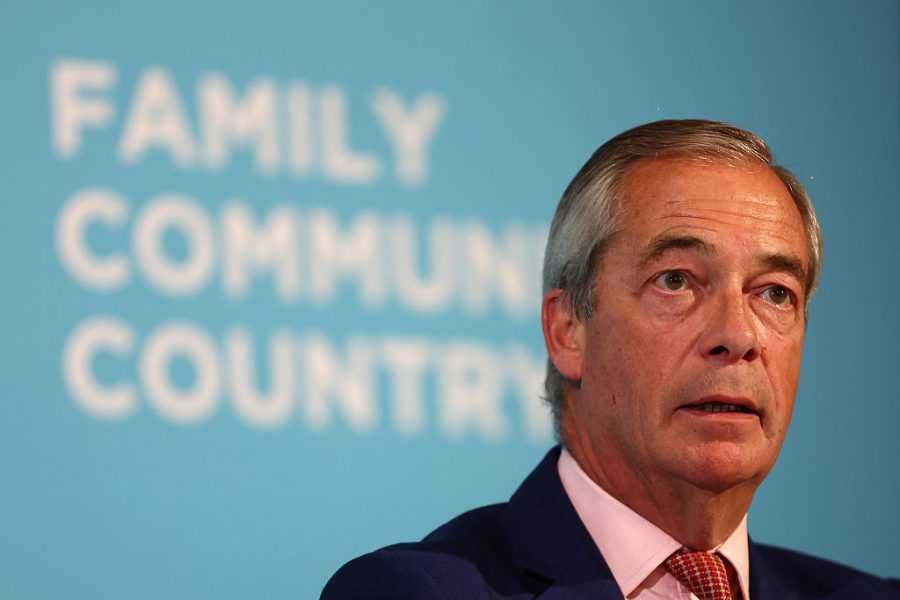Last week, Reform UK announced the most radical proposal on overhauling immigration by a mainstream political party in a generation. Under their new plans, migrants in the UK with indefinite leave to remain (ILR) would have to reapply for residency and would lose access to welfare benefits, unless they qualify to become British citizens.
This is a British-preference immigration and welfare policy, the likes of which we have not seen since at least 1997. It is intended to avert the fiscal and social implications of giving permanent welfare access to the wave of migrants who entered the country after 2021 – the infamous ‘Boriswave’ – which saw net migration surpass 900,000 in 2023. But the policy may also affect those who arrived before then.
Border control is one of the few fundamental responsibilities of any nation
The Prime Minister, Keir Starmer, has called this proposal ‘toxic’ and ‘racist’ in advance of Labour’s annual conference. Rachel Reeves, meanwhile, has stated her preference for even more immigration via the planned calamitous ‘reset’ with the EU, believing that 50,000 migrants a year from Europe is just what the economy and the public finances need.
So far, much of the discussion has focused on residency and whether it will lead to the automatic deportation of some legal migrants. Those with ILR will be asked to reapply for the new scheme and present a record of their contributions to the country. Some have criticised this for supposedly pulling the rug from underneath those who arrived in this country legally. ILR is not the same as permanent settlement; it is a lesser status than British citizenship. There have always been conditions under which it can be revoked, as outlined in the Nationality, Immigration and Asylum Act 2002. Reform’s proposals would, however, expand those conditions significantly.
While the Prime Minister is attacking Reform as ‘racist’ for this policy, both Labour and the Conservatives have committed to variants of the same thing, such as extending the qualification period for ILR from five to ten years. These amount to a similar policy of retrospective changes to eligibility for residence and welfare benefits. Despite Keir Starmer’s protestations over the weekend, his Home Secretary, Shabana Mahmood, remains committed to reforming ILR as well. The centre ground has shifted significantly.
It should be considered normal and legitimate for any nation to review the visa status of migrants, as border control is one of the few fundamental responsibilities of any nation. In a democracy, the public should also be able to decide who has a right to enter and reside in their own country. That should be the case even if this review takes place retrospectively, as ILR has always been conditional.
Where Reform’s policy does become more radical, however, is access to welfare. By ending entitlement to welfare benefits for anyone who is not a British citizen, this proposal changes the relationship between the British state and those who have come here from overseas.
The effects of this could be vast. For example, a significant proportion of social housing tenants were born outside the UK and many of them are not British citizens. Around 10 per cent of social housing tenants across the country, excluding migrants who have subsequently naturalised, were born overseas, and in 2023-24, 13 per cent of new social settings went to foreign nationals. This means potentially hundreds of thousands of households, disproportionately in London’s expensive postcodes, could become free for British citizens, either socially or on the open market.
Earlier this year it was reported that around £1 billion was spent on Universal Credit for households of non-British citizens in March this year alone, a 30 per cent increase since 2022.While exact figures of the amount of housing benefit spent on non-British citizens are not known, if the proportion of housing benefit claimants who are migrants is similar to social housing tenants, that equates to around £1.5 billion of taxpayers’ money per year.
Considering the high rates of economic inactivity among social housing tenants in London, and the high rates of social housing occupation by foreign nations in the capital, these changes do not just present the opportunity for fiscal savings; they could also transform the economy of the capital for the better. In some boroughs of London, social housing makes up over 40 per cent of all households. In such expensive areas, where homeowners and private renters spend near-record sums to live and work in the nation’s capital, the knock-on effects of this policy could alleviate significant pressure on the housing supply, as those who cannot afford to live in the city without subsidy leave.
In this respect, Reform’s proposal would be the most significant change to immigration and welfare policy in years, arguably more radical than the recent announcement by Donald Trump that a $100,000 (£75,000) fee would be attached to H1-B visas, although this appears to only affect future visa claims. However, despite this radicalism, restrictions on access to welfare have been popular with the British public for a long time: voters regularly cite cutting immigration as the most important issue facing the country, as well as reporting growing dissatisfaction with migration in general.
Some exemptions and refinements to this policy may emerge. Reform UK states they will not threaten the settled status of EU nationals in the UK, but will seek to negotiate how they access benefits with Brussels. This would be a welcome move, considering that over 700,000 EU nationals are claiming Universal Credit currently, more than the total number of British people living in France and Spain combined. Britain has a strong hand to play with Europe, considering the asymmetric nature of migration: many more Europeans want access to Britain than vice versa. Thanks to Reform, the Overton window on migration and welfare has permanently moved in Britain, and a new consensus that British immigration and welfare policy should prioritise the British people and the British interest has formed.







Comments